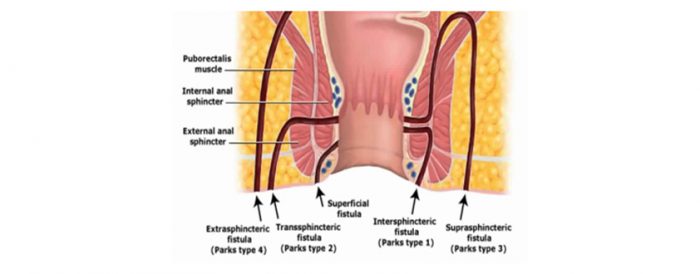What is Anal Fistula?

What are the symptoms of anal fistula?
- Pus or bloody discharge
- Constant pain, throbbing and worse when sitting down
- Depending on the presence or severity of infection- Pain, smell, tenderness, fever
What are the types of fistula?
- Extrasphincteric
- Suprasphincteric
- Intersphincteric
- Transphincteric
What is the treatment of fistula in Anal fistula?
- Surgery is a procedure of choice
- Fistulotomy – lay -open the tract
- Fistulectomy – Excision of the tract with or without seton
What are treatment options for Rectal Prolapse?
Nonoperative ManagementGenerally, a prolapsed rectum can be reduced with gentle digital pressure. Although no medical treatment is available for rectal prolapse, internal prolapse should always be first treated medically with bulking agents, stool softeners, and suppositories or enemas.
Operative managementSurgical approaches in rectal prolapse can be either perineal or abdominal. A perineal approach (or trans-perineal) refers to surgical access to the rectum and sigmoid colon via an incision around the anus and perineum (the area between the genitals and the anus). Abdominal approach (trans-abdominal approach) involves the surgeon cutting into the abdomen and gaining surgical access to the pelvic cavity. Procedures for rectal prolapse may involve fixation of the bowel (mesh or suture rectopexy), or resection (a portion removed), or both. Abdominal operations may be open or laparoscopic (keyhole surgery)
Laparoscopic proceduresRecovery time following laparoscopic surgery is shorter and less painful than following traditional abdominal surgery. Rectopexy and anterior resection have been performed laparoscopically with good results.
you can reach directly to Dr. Arun Bhardwaj at +91-8506856072, 9716972820